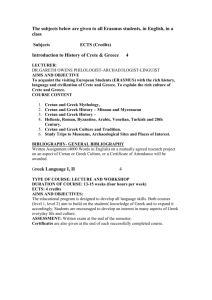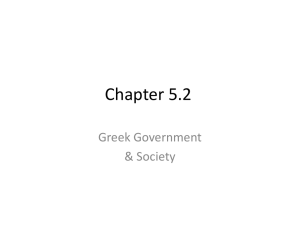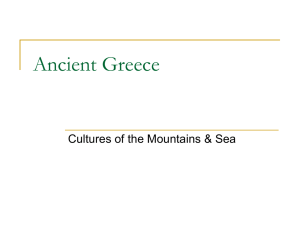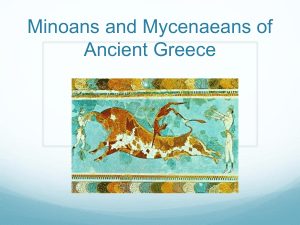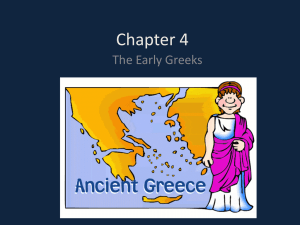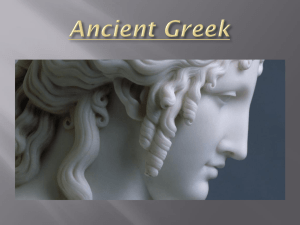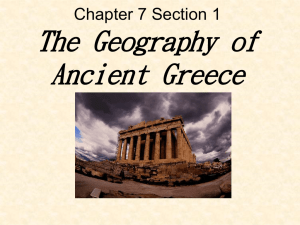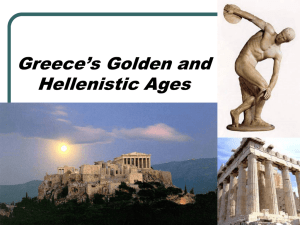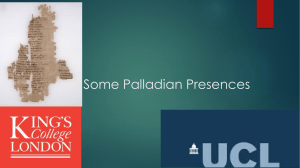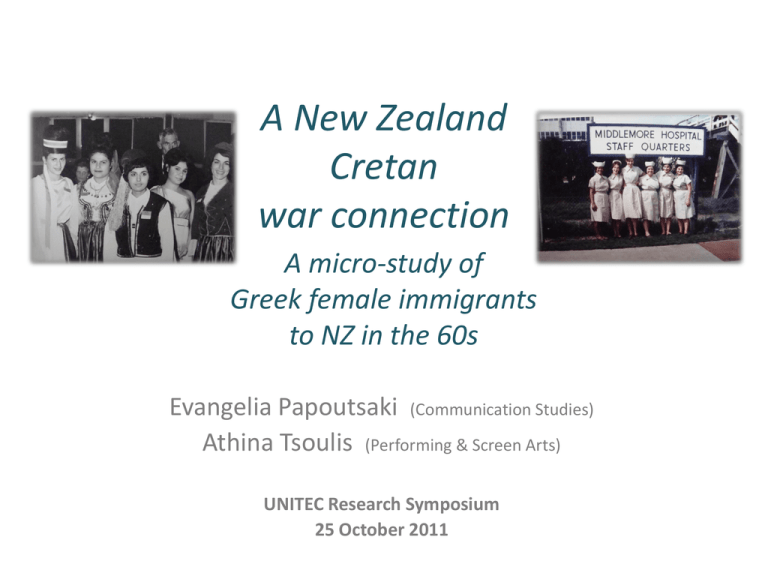
A New Zealand
Cretan
war connection
A micro-study of
Greek female immigrants
to NZ in the 60s
Evangelia Papoutsaki (Communication Studies)
Athina Tsoulis (Performing & Screen Arts)
UNITEC Research Symposium
25 October 2011
THE
CONTEXT
Many Greeks left Greece post WWII for economic reasons resulting
in large waves of migration to the US, Canada, Australia, Germany
amongst others.
New Zealand had much smaller numbers coming to its shores.
However, an internationally based scheme saw significant numbers
of Greek women migrate to NZ in the 60’s to work as domestics in
hospitals and hotels.
A NZ-Crete War connection
These women were assisted through a two year work-visa.
This migration radically altered the sex ratio of the NZ Greek
population (predominantly male)
The Project Aims
To document the personal narratives of these Greek female
post-war immigrants to New Zealand
Explore from a gender perspective how women experience
migration
Follow the migration loop - Compare migration experiences
between those women who chose to stay & those who either
returned to Greece or chose to migrate for the second time to
Australia
With the support of the Greek Community in Auckland & funding
from the Australian Sesquicentennial Gift Trust for Awards in Oral
History/NZ Ministry of Culture and Heritage
Key Features
Single women (age group 16-35)
Arrived between 1962-64
Most from the island of Crete
Mostly from the western part of the
island (NZ soldiers stronger connection to
this part of the island)
Local newspaper story
Greek immigrants: Some of the 44
Greek girl migrants trained for hotel work
who arrived in New Zealand yesterday.
They were photographed in Wellington
before leaving for Auckland last night.
Underwent a period of training of 36 months in basic language &
domestic skills in Greece before
migration.
Intermarriage (higher ratio amongst
these female assisted immigrants)
than other Greek immigrants.
Upon arrival in NZ the women were boarded on trains and dropped
off in various parts of the country where they began work the very next
day in hospitals and hostels.
Upon completion of their 2 year contract, most moved to established
Greek communities (Wellington & Auckland).
This scheme resulted in a significant period of ‘chain’ migration
consisting of fiancés & close relatives assisted by these young women.
There were arranged marriages with men from Crete – NZ requirement was they had to
purchase a return ticket for the men and marry within a month from the prospective
groom’s arrival. But a significant number married non-Greeks.
By the 80s, a large number of these women returned to Greece/
Crete or chose to migrate for the second time to Australia for family
reasons and the attraction of Australia’s larger Greek communities.
An Oral History Methodology
Received training at the Alexander Turbull Library Oral
History Center
Time consuming process (pre-interviews phase – establish
trust /revisiting- maintaining a relationship)
Selection of Interviewees
Total of 16 Cretan women interviewed:
6 in New Zealand plus a Kiwi female
teacher; 5 in Australia; 5 in Crete.
Snowball / convenience sample Participants identified from the Greek
community resident in Auckland &
Wellington and their informal
relationships with women who moved
to Australia or back to Crete.
The Cretan societies in NZ & Australia
were approached & provided
assistance in locating women.
THE
PROCESS
The interviews followed the NZ Oral History guidelines & based
on an interview list based on the following themes:
Life in Crete - childhood memories, war memories, daily rhythm
of life, impetus to migrate, expectations, process to qualify;
Life in the NZ - arrival, early experiences and first impressions,
settling in, interactions at work & social life; creating social
networks to maintain sense of community and Greek culture,
contact with home;
Return visits to Crete - visiting home for the first time,
impressions, sense of belonging.
Reasons for choosing to stay, return to Crete or migrate to
Australia
The
Interviews
Text
Conducted mostly in the Greek
language, in the interviewees’ own
surroundings & recorded on digital
recorder.
Extra interviews have been recorded
in Crete from relatives & friends to
add dimension to the women’s
accounts.
Relevant documentation & photos
enhanced the interview process &
collected for archival purposes.
All records will archived at the Oral
History Archives – National Library in
Wellington.
At a later date, some stories will be
visually recorded on HD digital for a
feature length documentary. Some
funding has been obtained to begin
this process.
Why Did They
Leave?
Impact of World War II upon their childhood & young
adulthood as this part of Crete suffered more greatly
than many other parts of Greece due to helping the
Allied soldiers escape:
Economic - Homes and personal belongings burnt and destroyed;
Working constantly from a young age with little leisure;
Affected future prospects i.e.. dowry;
Disrupted schooling;
Personal - childhoods coloured by trauma of war, ailing or
missing fathers, personal wartime experiences, sadness at the
destruction.
TRAUMA OF WAR
“They [Germans] gathered all our possessions from our house and put it
in a big pile and burned it and we were left with nothing, not even a change
of clothes.”
“My mother had to tear one of her dresses to make nappies for the two
small ones.”
“They lined him up with his four cousins...My father watched as they shot
one by one and when it came to his turn he ... jumped and rolled down the
hill the Germans firing after him. He fell into the pond, which was at the
bottom of the hill and he hid under a ledge. He had been shot and his
blood floated onto the surface of the water. Later, the villagers came and
dragged him out.” Anastasia Despotaki
“As I walked through the fields I trod on the boy’s foot. He was dead…..I
started screaming….we went to Kira Maria whose son it was and told
her…Kiria Argiro, Kiria Chrisanthi, Kiria Maria and Kiria Evthokia carried
his body in their arms down to St Nicholas in Agia Irini.” Argiro Pendaraki
Giorgos
Despotakis by the
memorial to the
cousins who were
killed.
Ruins of the
Despotaki house
LOSS OF EDUCATIONAL OPPORTUNITIES
“And sometimes one of us have to stay behind, we have to look after dad
because my father was paralyzed. Mum have to go to work. So, one, we all
take sort of turns. One stay one day from school then the other one the
next day and more or less we have been educated because we never fill
up the whole year to school.” Adriana Weston
“One day my mother called us together and we sat at the table, I
remember it well...and said ‘I can’t educate you all, the boys will continue
at school and the girls will have to learn a trade”.” Argiro Pendaraki
“My teacher said they had two places for
students to go to study in Hania and then
Athens free of charge and one was for
me. My mother wouldn’t let me go
because my father was dead and my
mother was very protective. .. It was hard
because I loved learning.” Alexia Pendaraki,
“We were picking olives and we worked everyday. It was
raining all day and we had a sack to cover our heads as we
picked olives. A man came by and he said to us slaving away
in the heavy rain. ‘Why don’t you leave and go to another
country’ and he gave us a newspaper which had an item about
migrating.” Anastasia Despotaki
CONSTANT
“People worked from sunrise to sunset every day. That’s what
HARD
we knew.” Spirithoula Vlondaki
WORK
“Yes
and we thought eh, hello, there must be a better life than
this... We were so naïve those days, let’s face it and we just
looking for something better.”
“All I wanted is at those days to have a nice car, because a rich
family back there they used to have ... Always dream to have a
nice car. Stupid might be but yeah. ‘I would have gone
anywhere’. Adriana Weston
FUTURE
PROSPECTS
The Dowry system prevailed in Greece at the
time. Marriages were arranged according to
status and reputation as the families, not just
the couples, were joined by marriages;
There was order to the way families married
off their children - by age and gender. Eldest
daughter was married first working
downwards and then the sons could marry.
The expectation was that a dowry would be
provided by the girl’s parents - usually
something substantial.
Families struggled to buy a house for all their
daughters and this put a strain on resources.
Shortage of men due to large number killed in
the War compounded the issue
EMERGENT
THEMES
Questioning of cultural norms
for Greek women in a
patriarchal culture;
Frustrated aspirations - wanted
something different;
Yearning for adventure;
Desire for economic
independence.
“I could not understand why I have to pay a man to become a slave
to him. Why? ... You marry somebody and you have no right to talk,
I’m talking about Crete ... You do as you are told, you treat him like a
God and you just work.” “I had those views forever since I noticed
that a girl has to buy a husband.”
Alexia Pendaraki
“In those years we didn’t know anything, I
don’t know how to say it but we didn’t
know how to go out to work, earn money.”
“ I was asked for when I was fifteen but I
must not have wanted that….. I saw our
neighbours leave, we stayed up late
talking and then we walked them to the
bus and I must have started dreaming.”
Adriana Weston
“I heard their stories about America,
Germany and something inside of me just
wanted to go. I wanted to leave. They
offered me matches from here, there and
everywhere but I didn’t want it. I just
wanted to leave.” Spirithoula Vlondaki
Intense feelings of loss
The NZ experience was accompanied by a deep sense of loss. Parting
from the known was abrupt. Realization of what they had given up only
hitting them as they boarded the plane - “I was crying all the way to
New Zealand and I haven’t stopped.”
Return visits to Greece were welcome on the one hand - “It was like I
was dead and I was resurrected” - but the loss of their village
communities hit them hard. People had left and the villages were
emptying and family homes crumbling from disuse.
Aikaterina Galanaki’s village,
Hosti.
Alexia Pendaraki’s village,
Agia Irini
Some had a feeling of being cheated
by the whole experience –
“If I knew what I know now I would have
never come”
“If Greece was what is it now, I would not
have come [to NZ]”
New found communities in NZ were
breaking up as people moved to
Australia or back to Greece.
Those moving to Australia longed for
compatriots in NZ with whom they had
shared a seminal life experience.
Found it hard to fit into Greek Australian
communities.
Returnees to Crete missed NZ & found
the new Greece hard to take.
Those agreeing to be interviewed
felt relatively positive about their
immigration experiences.
Phone conversations revealed that
those who did not want to be
interviewed did not “want to wash
their dirty linen in public.” One
resented coming to NZ to “wash
other people’s toilets.”
Sanitization of women’s accounts.
Greek concept of hospitality may
prevent them from openly criticizing
their host country.
LIMITATIONS

